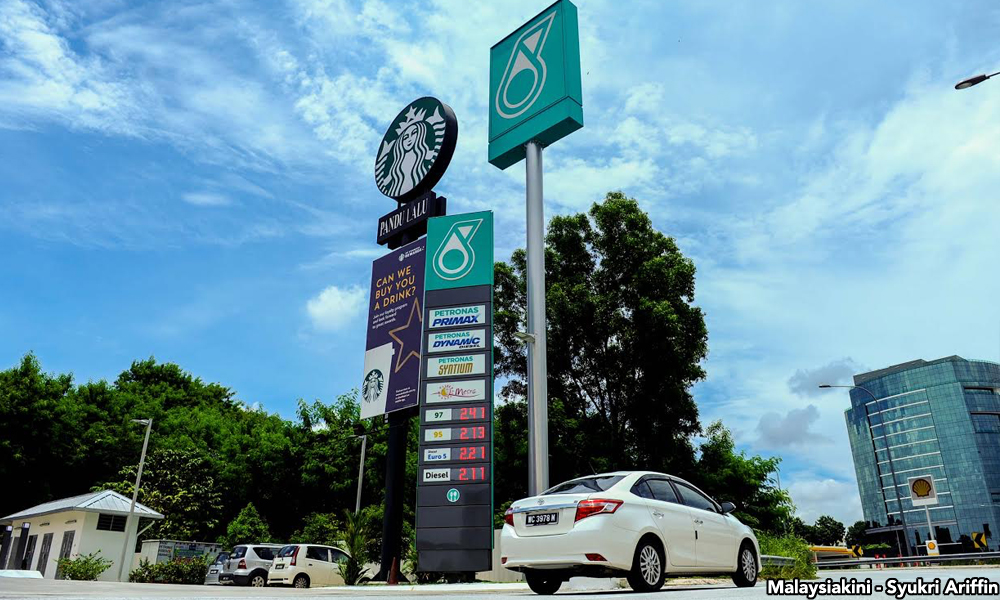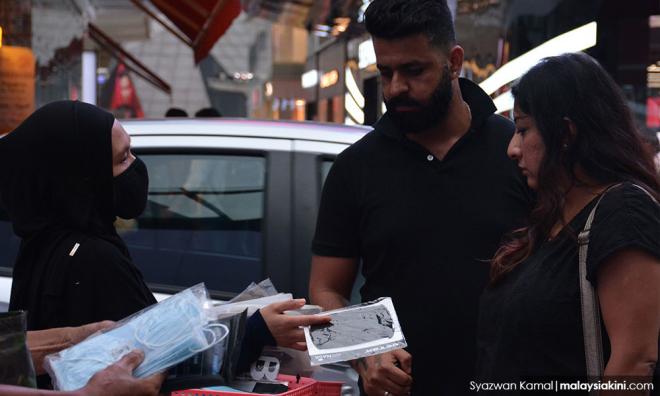
Published by The Malaysian Insight, image from Business Today.
Despite the already-low crude oil prices since the start of the year that was caused by price war involving Saudi Arabia and Russia, and abetted by the US, it has entered a more worrying state due to the impact from the unprecedented Covid-19 pandemic.
Weakened global demand, international travel bans and other forms of movement restrictions have caused glut in the oil and gas industry that leads to oil prices trending at low levels.
In the US, space to store the West Texas Intermediate (WTI) oil had become scarce that the US traders offer to pay people to take the oil off their hands.
Brent crude oil price is currently trending around US$20 (RM87.90) per barrel, lower than government’s new oil price forecast of between US$35 and US$40 per barrel.
Coordinated efforts to stabilise oil prices have been pursued by the Organisation of the Petroleum Exporting Countries (Opec) together with Opec+ with an agreement to reduce oil output by 9.7 million bpd in May and June.
This will be followed a gradual reduction in output by 7.7 million bpd from July 1 until December 31, and 5.8 million bpd for 16 months from January 1, 2021 to April 30, 2022.
Concurrently, Malaysia has agreed to cut 136,000 bpd in May and June, bigger than expected. However, these decisions are said to be too little and late considering how much subdued demand has impacted oil prices.
So far, lower global oil prices have benefited the consumers as fuel prices become more affordable. As of the current week, RON95 is priced at RM1.25/litre, RON97 at RM1.55/litre and diesel at RM1.43/litre.
However, the losers in this case are the domestic O&G companies as well as the government.
The volatile nature of oil prices could harm Malaysia given our country is net O&G exporter and dependent on oil revenue.
Also, an ironic loser is the petrol pump companies which dispense fuel at the retail level to consumers in need of petrol for their cars. Whether the price of oil is high or low, the margin for these companies selling petrol to consumers is very low.
Although an essential business under the movement control order (MCO), the retail demand for petrol is overwhelmingly reduced because of the restriction on travel.
They are reported to have a serious cash flow problem to order for more petrol despite the lower oil price should their existing reservoir of petrol at their pump station is exhausted post MCO or even during the MCO if it is extended indefinitely.
This is due to the “unique” nature of their industry where they have to pay in advance for the petrol supplied by the O&G companies before they can see the arrival of lorry truck carrying the petrol at their pump stations.
And if their plight in this regard is not addressed, there could be a crisis among owners of vehicles during post MCO where no pump stations have the petrol for them to buy.
Perhaps the O&G companies supplying them the petrol could offer a hefty discount or a moratorium on advance petrol supply ordered by these pump station companies.
Malaysia’s oil trade balance registered at RM36.7 billion in 2019 while oil-based revenue accounts for 20.7% of total government revenue.
Even in Budget 2020, this 20.7% projected revenue from oil is maintained out of a total projected revenue of RM244.5 billion. The government should reduce this dependence on oil revenue further.
Given the current fluctuations in oil price, there is a critical need for the government to diversify its revenue sources to ensure sustainability given the severity of the pandemic, which would require further stimulus packages.
So, the first thing that needs to be done is to recalibrate the national budget in a timely manner to reflect the changes in economic conditions.
For instance, an oil-producing Gulf state, Oman that has been badly impacted by present economic conditions announced that it would review its budget every three months.
Finance Minister Tengku Zafrul Tengku Abdul Aziz recently said that the government has priced in the lower global oil prices into its newly expected deficit of more than 4% in 2020.
The government would also continue to monitor the change in oil prices, which is the right approach.
Nonetheless, an updated guidance is needed on whether every change in oil price by US$1 would still result in a loss of RM300 million in government revenue.
Secondly, one of the policy recommendations that has resurfaced in diversifying revenue base is to reintroduce Goods and Services Tax (GST).
Despite the high possibility that this response would not be well accepted by many given the current struggles, it could be studied thoroughly to be implemented in the medium term should conditions improve by initiating it with a rate as low as 1-2 per cent.
As said by a UOB economist Julia Goh, “GST is a broader-based tax and is positive for fiscal strength, but if introduced at the wrong time can be more damaging for consumer sentiment and the economy.”
Thirdly, as proposed before, government can tap Kumpulan Wang Amanah Negara that was established in 1988. The fund conserves collection of wealth from oil and other natural resources for future generations and the asset base stood at RM16.9 billion as at end-2017.
Next, another consideration would be to establish an oil stabilisation fund with contribution from oil revenue excess when oil prices are in boom.
This is to address the short-term challenges of fiscal policy and functions to make policy conduct less volatile by de-linking public spending from oil prices.
This type of fund exists in countries like Nigeria, Algeria and Russia.
In simple term, this Fund helps to provide buffer when oil prices are low as government can draw on the fund and prevent sharp adjustments in expenditure.
However, challenges could arise in terms of governance, transparency and accountability, thus it might not be effective for some oil-exporting countries.
These are some of additional measures that can be considered by the federal government to control the risks of relying on oil-based revenue during shocks.
Petronas has already said any additional funding from it to help contribute to government stimulus packages would be dependent on their ability to fund the company’s ongoing operations, service debts and other obligations amid the weakening oil prices.
So, this is one of the few instances that proves the need for government to be more flexible by not being too reliant on the O&G sector and to start looking at sectors which are relatively more sustainable and add values to the economy.
Jamari Mohtar and Sofea Azahar are part of the research team at EMIR Research, an independent think-tank focused on strategic policy recommendations based on rigorous research.
Diterbitkan oleh Malaysiakini, gambar daripada Malaysiakini.
Meskipun harga minyak mentah terlalu rendah sejak awal tahun ini disebabkan perang harga yang melibatkan Arab Saudi dan Rusia – serta diapi-apikan oleh AS – ia kini memasuki keadaan lebih membimbangkan kerana impak pandemik Covid-19.
Permintaan global yang lemah, larangan perjalanan antarabangsa dan sekatan pergerakan lain menyebabkan lebihan minyak mentah dalam industri minyak dan gas (O&G) membawa kepada penurunan harga minyak pada tahap paling rendah.
Di AS, kekurangan tempat yang amat ketara untuk menyimpan minyak West Texas Intermediate (WTI) menyebabkan pedagang minyak sanggup membayar kepada orang yang sudi mengambil minyak daripada mereka.
Harga minyak mentah Brent kini berada pada paras AS$20 (RM87.90) setong, lebih rendah dari harga minyak yang baru disasarkan kerajaan bernilai di antara AS$35 hingga AS$40 setong.
Usaha menyelaraskan harga minyak yang stabil dilakukan oleh Pertubuhan Negara-negara Pengeksport Petroleum (Opec) bersama OPEC + dengan perjanjian untuk mengurangkan pengeluaran minyak sebanyak 9.7 juta tong sehari (bpd) pada Mei dan Jun.
Ini akan diikuti dengan penurunan pengeluaran secara beransur-ansur sebanyak 7.7 juta bpd dari 1 Julai hingga 31 Dis tahun ini, dan 5.8 juta bpd selama 16 bulan dari 1 Jan 2021 hingga 30 April 2022.
Pada masa yang sama, Malaysia bersetuju untuk mengurangkan pengeluaran sebanyak 136,000 bpd pada Mei dan Jun, iaitu jumlah lebih besar daripada jangkaan.
Namun, keputusan tersebut dikatakan terlalu sedikit dan lambat memandangkan betapa permintaan yang agak lemah telah mempengaruhi harga minyak.
Hadapi masalah aliran tunai
Sejauh ini, harga minyak global yang lebih rendah menguntungkan pengguna kerana harga bahan bakar menjadi lebih berpatutan. Sehingga minggu ini, RON95 berharga RM1.25 seliter, RON97 pada RM1.55 seliter dan diesel RM1.43 seliter.
Yang rugi kali ini ialah syarikat O&G domestik dan juga kerajaan. Ketidaktentuan harga minyak boleh membahayakan Malaysia memandangkan negara kita adalah pengeksport bersih O&G dan sangat bergantung kepada pendapatan minyak.
Selain itu, satu pihak yang – ironisnya – rugi ialah syarikat pam petrol yang mengeluarkan bahan bakar di peringkat runcit kepada pengguna yang memerlukan. Sama ada harga minyak tinggi atau rendah, keuntungan bagi syarikat-syarikat ini adalah sangat rendah.

Walaupun ia merupakan perniagaan penting di bawah perintah kawalan pergerakan (PKP), permintaan runcit untuk petrol berkurangan kerana sekatan perjalanan.
Mereka dilaporkan mengalami masalah aliran tunai yang serius untuk meminta lebih banyak petrol – walaupun harga minyak lebih rendah – sekiranya simpanan yang ada di stesen mereka habis, sama ada semasa PKP atau jika ia diperpanjangkan.
Ini disebabkan oleh sifat “unik” industri yang memerlukan mereka membayar terlebih dahulu untuk petrol yang dibekalkan oleh syarikat O&G sebelum dapat melihat lori tangki datang membawa bahan berkenaan.
Dan jika masalah mereka itu tidak ditangani, mungkin ia akan mencetuskan krisis dalam kalangan pemilik kenderaan semasa pasca-PKP apabila tidak ada stesen pam yang mempunyai bahan untuk dibeli pelanggan.
Mungkin syarikat O&G yang membekalkan petrol dapat memberikan potongan harga yang besar atau moratorium pembekalan petrol yang dipesan terlebih dahulu.
Memandangkan ketidaktentuan harga minyak, terdapat keperluan kritikal bagi kerajaan untuk mempelbagaikan sumber pendapatannya kerana kesan teruk wabak yang mungkin memerlukan pakej rangsangan lebih lanjut.
Jadi, perkara pertama yang perlu dilakukan ialah menentuukur semula belanjawan negara tepat pada masanya untuk mencerminkan perubahan keadaan ekonomi.
Sebagai contoh, sebuah negara penghasil minyak di Teluk, Oman, yang berdepan dengan impak buruk oleh keadaan ekonomi sekarang mengumumkan akan mengkaji semula belanjawannya setiap tiga bulan.
Menteri Kewangan Tengku Zafrul Tengku Abdul Aziz baru-baru ini berkata kerajaan mengambil kira harga minyak global yang lebih rendah dalam menentukan defisit yang baru dijangka – lebih 4 peratus pada 2020.
Tubuh Dana Kestabilan Minyak
Meskipun begitu, panduan terkini diperlukan untuk memastikan jika setiap perubahan harga minyak sebanyak AS$1 akan tetap mengakibatkan kerugian pendapatan kerajaan sebanyak RM300 juta.
Kedua, salah satu saranan dasar yang muncul dalam mempelbagaikan asas pendapatan ialah memperkenalkan semula cukai barang dan perkhidmatan (GST).
Walaupun kemungkinan besar saranan ini tidak akan diterima baik kebanyakan orang karena kesukaran yang dihadapi sekarang, ia dapat dikaji secara menyeluruh untuk dilaksanakan dalam jangka pertengahan jika keadaan bertambah baik dengan kadar permulaan serendah 1 dan 2 peratus.
Sebagaimana yang dikatakan oleh ahli ekonomi UOB, Julia Goh, “GST adalah cukai yang lebih luas dan positif untuk kekuatan fiskal, tetapi jika diperkenalkan pada waktu yang salah ia lebih merosakkan sentimen pengguna dan ekonomi”.
Ketiga, seperti yang diusulkan sebelumnya, kerajaan dapat memanfaatkan Kumpulan Wang Amanah Negara yang ditubuhkan pada 1988. Dana ini menyimpan kekayaan dari minyak dan sumber semula jadi lain untuk generasi akan datang dan asas aset berjumlah RM16.9 bilion pada akhir 2017.
Pertimbangan selanjutnya ialah menubuhkan Dana Kestabilan Minyak dengan sumbangan lebihan hasil minyak ketika harga minyak sedang meningkat.
Ini adalah untuk mengatasi cabaran jangka pendek dasar fiskal dan berfungsi menghasilkan dasar yang lebih menentu dengan menyah paut membatalkan perbelanjaan awam dari harga minyak.
Dana ini wujud di negara-negara seperti Nigeria, Algeria dan Russia.
Petronas telah mengatakan sebarang dana tambahan dari agensi itu untuk menyumbang kepada pakej rangsangan kerajaan bergantung pada kemampuannya untuk membiayai operasi, melunaskan hutang dan kewajipan syarikat di tengah-tengah harga minyak yang semakin lemah.
Ini semua menunjukkan peri perlunya kerajaan lebih fleksibel dengan tidak terlalu bergantung pada sektor O&G dan mula melihat sektor lain yang lebih lestari serta menambah nilai ekonomi.
Jamari Mohtar dan Sofea Azahar merupakan Pasukan Penyelidik di EMIR Research, sebuah organisasi pemikir bebas yang berfokuskan kepada pencernaan saranan-saranan dasar strategik berteraskan penyelidikan yang terperinci, konsisten dan menyeluruh.

.jpg)